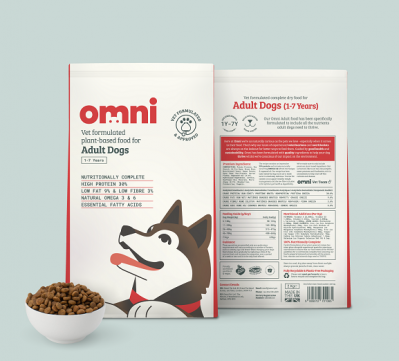Pet food ingredients
Study confirms low glycemic properties of isomaltulose in dogs

The research findings suggest that isomaltose is a suitable low glycemic ingredient for use in dog food, triggering a lower blood glucose rise after consumption.
In-vitro and in-vivo studies initiated by Beneo and conducted by Corbel et al, evaluated the digestion of isomaltose, as well as its glycemic and insulinemic effects in dogs, compared to other relevant carbohydrate sources.
“Carbohydrates are notable components of today's dog foods, and low glycemic diets have been shown to be of relevance in improving metabolic health in humans as well as in certain animal species such as dogs. The low glycemic properties and digestive tolerance of isomaltulose at a dosage of 1 g/kg/day could be confirmed in the present studies with healthy Beagle dogs.
“Further investigation of related health benefits of isomaltulose in dogs seems worthwhile,” concluded the research team.
The number of overweight and obese dogs has steadily increased over the last few decades. Excessive weight is linked to metabolic and skeletal associated disorders.
Pet owners globally, according to Beneo's Consumer Research on Attitudes towards Pet Food in US, Brazil, UK, Germany & China 2021, say that on-pack communication about helping to control their pet’s weight naturally (87%), or having a lower impact on blood sugar levels (85%), very much or somewhat affects their purchase intention of a pet food product.
Low glycemic diets have been shown to support weight loss and improve metabolic health in both humans and dogs. Therefore, finding suitable low glycemic ingredients for dog food is critical, said Beneo.
The research
In total, three studies were conducted by teams from universities in Utrecht and Wageningen. The first, an in-vitro study of small intestinal tissue samples from three dogs, evaluated the small intestinal hydrolysis of isomaltulose compared to sucrose, maltose, maltodextrin, lactose, and ɑ-trehalose. The researchers wanted to confirm whether dogs have the ability to digest isomaltulose, and they also wanted to compare it with other carbohydrate sources. The findings showed that it can be digested by canine intestinal enzymes, and that it has a lower enzyme activity compared to high glycemic carbohydrates, indicating a slower rate of hydrolysis.
The second and third studies compared the effects of isomaltulose, sucrose and maltodextrin in an in-vivo set-up. One of the studies assessed the glycemic effects of the three carbohydrates in nine dogs and using a 3x3 Latin-square design. After an overnight fast, the blood glycaemia and insulinemic were measured 0-180 minutes after the administration of a single dose of either isomaltulose, sucrose or maltodextrin. The results showed that isomaltulose significantly lowered blood glucose and insulin responses in the dogs, compared to maltodextrin or sucrose.
The goal of the final study was to assess the glycemic properties of isomaltulose in dogs, after continuous intake. The hypothesis was that their ability to digest isomaltulose might evolve through adaptation, so that its impact on blood glucose levels would get closer to the other carbohydrates. In this study, 18 dogs received a 50:50 mix of isomaltulose and sucrose (1g per kg bodyweight) daily for two weeks. They were then split into three equal groups which each received a single dose of either isomaltulose, sucrose or maltodextrin after an overnight fast.
Following this, the dogs’ blood glucose and insulin responses were measured. Even after continuous intake over two weeks, the low glycemic and insulinemic properties of isomaltulose were confirmed.
Dog health
These research findings offer the first comprehensive characterization of isomaltulose with respect to its digestibility and metabolic effects in dogs, noted Dr Maygane Ronsmans, product manager, animal nutrition, Beneo.
“The low glycemic properties of isomaltulose already shown in other species, including humans, pigs, and rodents, have now been confirmed in dogs. The combined results of this study suggest that isomaltulose would be a suitable energy source in dog food, which contributes to a more stable blood glucose response, and may improve the dog’s metabolic profile and overall health.”
Beneo derives isomaltulose from sugar beet at its production plant for functional carbohydrates in Offstein, Germany.









